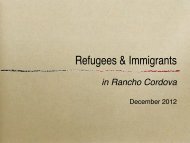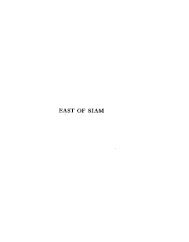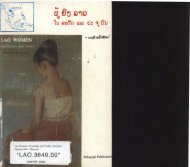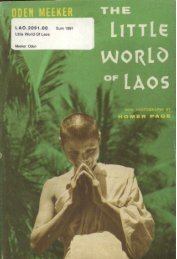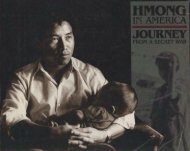PEOPLE
Grant, The Boat People - Refugee Educators' Network
Grant, The Boat People - Refugee Educators' Network
- No tags were found...
Create successful ePaper yourself
Turn your PDF publications into a flip-book with our unique Google optimized e-Paper software.
The Boat Psoplc<br />
reputation as s haven for the persecuted. There are now 4 200 000<br />
foreigners living in France, among them 150 000 registered refugees.<br />
After the United States and Australia, France is the third host<br />
country to refugees, with Britsin close behind in fourth place. The<br />
victim of politiml pcrsrmtion have come to France in wave8 - the<br />
White Russians after the first world war, the Spanish republicans<br />
in 1938, a million French Algerians after Algeria won its independence,<br />
and now the Indo-Chinese.<br />
Since the collapse of the Saigon rCgirnt in 1975, France had been<br />
accepting the immigrants at the rate of 1OOO a month. But the boat<br />
people beg~n arriving at a time when the Frmch welcome was a<br />
shade less bright than it hd been in the past. Faced with high unemployment,<br />
the French government had recently decided it would<br />
reduce its total foreign population by one million before 1985.<br />
Ntvettheless, President Giscard d'Estaing met the new demand for<br />
asylum by finding rmm for an additional 5000 wd it is estimated<br />
that, by the end of the ye=, France will have an Indo-Chinese immigrant<br />
population of 61 000,<br />
The 5000 quota came as a bitter disappointment to those who had<br />
hoped Paris would make a generous gesture that would jolt the conseicnce<br />
of the world. Jean-Paul Sam said it was tantamount to m<br />
out-of-court dismissel of the demand for action. At a demonstration<br />
in the gtreets of Wris in favour of a much larger quota, a young Vietnamese<br />
girl read a line from a poem by her father: 'Open your city<br />
as one opens one's door at dawn'. To many Frenchmen their door<br />
stcmed only just ajar. Pierre Mcndcs-Ffance, who as prime minister<br />
had terminated French rule in Viemam, said:<br />
Five thousand people is nohh~, It even falls well shon of the total offered<br />
by individuals and maym. The least the government could have done was<br />
oEtr the local authorities the number of refugees they had declared themselves<br />
ready to accept. If Valery Giscard d'Esmhg had announced 'France<br />
accepts 50 000 refugees', he would hew giwn our mnv an enormous<br />
mmql advanmge over its allies and, what is most important, might have compelled<br />
them to makc similar effwts.<br />
French diplomatic activity during the worst months of the boat<br />
pplt emergency was governed by the notion that nothing was to<br />
be gained by driving Hanoi into a comer. France urged Hanoi to<br />
I<br />
.<br />
I<br />
impose a moratorium on the departure of refugees, even to establish<br />
camps where the exodus would be controlled so as not to awamp the<br />
reception facilities of the host countries. 'Thc moratwium is better<br />
than death at sea,' said the French foreign minister, Jean Franwis-<br />
Foncet, in s comment on Hanoi's promise, at the VNHCR meeting at<br />
Geneva in July 1979, to halt the flow of refugees.<br />
This did not go unchallenged, Olivier Todd, of the Paris weekly<br />
magazine L 'Express, described the Geneva all for a moratorium 'a<br />
moral and juridical scandal: He pointed out that it was the fist time<br />
that an international organization had been encouraged to urge one<br />
of its member nations to limit the right of its citizens the freedom<br />
of movement. Todd charged that the United Nations would be<br />
giving the politburo and police of Hanoi the implicit right to say<br />
who should bt allowed to leave the country and when they should<br />
go.<br />
For those who succeed in reaching France, the first stop is one<br />
uf the three transit centres of an organization called France Terrt<br />
d'Asilt. These are crowded but mmfomble hostels where new<br />
arrivals art put through medical examinations and interviews to<br />
assess how much help they will need in making a new start. Considering<br />
what many of them kve gone through, their phpical condition<br />
is surprisingly good. But psychological damage L another<br />
matter, Thme who make the first contacts with the refugees feel they<br />
arc dealing with people who have been stunned, 'One must never<br />
conclude from their $milts that all is well,' says an official of France<br />
Tcm d'Asi1e. 'There are all sorts of anxieties at work underneath!<br />
For the most fortunate, the new life a n start straight away. They<br />
have relatives, friends and accommodation waiting for them, and<br />
their knowledge of the French lenguagc means that acclimetization<br />
is easier. The less fortunate move on to ccntrcs in the prwincm<br />
where they spend up to six months - wmetimes longer in difficult<br />
cases - learning Frmch snd king insmeted in thc customs and formalities<br />
of life in their new country. The French imprint on Vietnam<br />
faded more rhan one might expect: two-thirds of the refugees speak<br />
no Frmch.<br />
Somcwhcrc along the process of rehabilitation many of the exiles<br />
encounter a formidable anxiety bnrricr. During thc deal of the<br />
escape they were sustained by a vague iden of the future as a rescue





